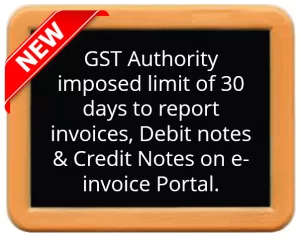In a significant development for businesses in India, the Goods and Services Tax (GST) Authority has introduced a new reporting deadline for e-invoices. Effective from 1st November 2023, this regulation mandates that taxpayers with an Aggregate Annual Turnover (AATO) greater than or equal to 100 crores have a 30-day window to report invoices from the date of issue. This change aims to streamline the GST reporting process and ensure greater compliance among large businesses.
Key Highlights:
- Effective Date: The new reporting deadline will come into effect on 1st November 2023, giving businesses ample time to adapt to the change.
- Applicability: Taxpayers with an AATO of 100 crores or more are subject to this new reporting timeline. Smaller businesses will continue to follow the existing reporting guidelines.
- E-Invoice Portals: The 30-day limit applies to e-invoice portals specifically, making it essential for eligible taxpayers to ensure their compliance with this new directive.
- Transparency: This regulation is a significant step towards improving transparency in financial reporting, which ultimately benefits the government in monitoring tax collections and reducing tax evasion.
- Penalties for Non-Compliance: Non-compliance with this new rule may lead to penalties and legal consequences. It is crucial for affected taxpayers to adapt swiftly to this change to avoid such repercussions. According to the earlier notification released on May 6, 2023, the GST law imposes a huge penalty as follows-For incorrect invoicing – Rs.25,000 per invoice (for the issue of the invoice that lacks IRN and signed QR code). For non-generation of an e-invoice – 100% of the tax due or Rs.10,000, whichever is higher, for every invoice. (Where the invoice is not issued)
Conclusion:
The GST Authority’s decision to introduce a 30-day reporting deadline for e-invoices is a significant step towards enhancing transparency and efficiency in the Indian tax system. While it may pose some challenges for large businesses, it ultimately aims to create a more level playing field, reduce tax evasion, and improve revenue collection for the government. Businesses falling within the ambit of this regulation should take proactive steps to ensure they meet the reporting requirements and avoid potential penalties. By embracing this change, the business community can contribute to a fair and robust taxation system in India.
This Article is only a knowledge-sharing initiative and is based on the Relevant Provisions as applicable and as per the information existing at the time of the preparation. In no event, RMPS & Co. or the Author or any other persons be liable for any direct and indirect result from this Article or any inadvertent omission of the provisions, update, etc. if any.
Published on: September 18, 2023


